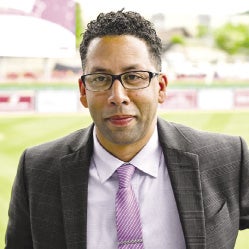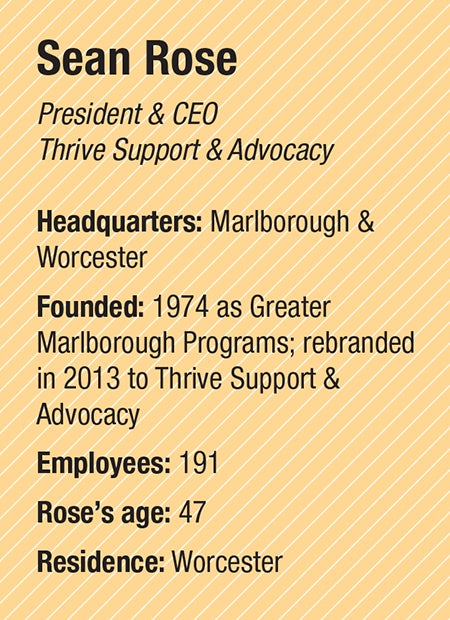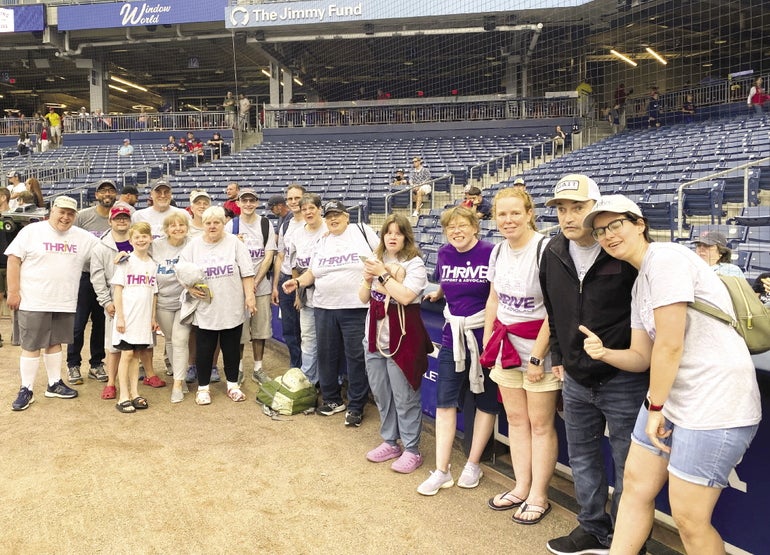Now known as Thrive Support & Advocacy, the nonprofit has substantially grown under the leadership of former Worcester city councilor Sean Rose.
Get Instant Access to This Article
Subscribe to Worcester Business Journal and get immediate access to all of our subscriber-only content and much more.
- Critical Central Massachusetts business news updated daily.
- Immediate access to all subscriber-only content on our website.
- Bi-weekly print or digital editions of our award-winning publication.
- Special bonus issues like the WBJ Book of Lists.
- Exclusive ticket prize draws for our in-person events.
Click here to purchase a paywall bypass link for this article.
Thrive Support & Advocacy in Marlborough began 50 years ago when a group of parents with developmentally disabled children decided to create Greater Marlboro Programs. In the 1970s, individuals with disabilities were often sent to state institutions. As a result, the founders wanted to create recreational and educational programs to keep individuals with their families. Now known as Thrive Support & Advocacy, the nonprofit has substantially grown under the leadership of former Worcester city councilor Sean Rose.

What services does Thrive offer clients and their families?
We have four group homes in Marlborough. We have a home in Shrewsbury for those who are visually impaired and have cerebral palsy. Then we have a group home in Worcester for those with intellectual disabilities.
We do in-home services to support caregivers. Our supportive employment services help folks learn a vocation, find internships, and ultimately create job opportunities. Then we have our social and recreational calendar, where any individual who is a Thriver in Worcester County or MetroWest can participate in nearly 50 activities ongoing each month. We created a specialized food pantry since nearly 70% of individuals we serve suffer from food insecurity. Lastly, our Family Support Center in Worcester helps families navigate the services we offer and connects them to other community organizations they may need.

Have you seen a demand for your services grow since the COVID pandemic?
We've seen a massive increase. When you think about somebody who is developmentally disabled, a big part of their energy and their lifeblood is connection to people. It promotes positive brain development and social skills. So, when these folks were told they could not be next to anyone for a couple of years, that became devastating. The pandemic really took a toll on them because the connection they yearned for was stolen from them.
Who is eligible for Thrive’s services?
According to the Massachusetts Department of Developmental Services, once an individual graduates high school, or turns 22, they move out of the oversight of the state Department of Education. They then move into the world of DDS, and that's where organizations like Thrive pick up.
Meanwhile, in our Family Support Center in Worcester, it doesn't really matter what age you are. The goal is to help anybody and everybody. Not everybody who we serve is under the umbrella of DDS. There are some families who take care of their family members on their own without the support of the state.
You’ve led Thrive for nearly four years. What are your greatest achievements?
Thrive has very low overhead in terms of our executive team. The organization has nearly doubled in size since I've started, but the executive team has stayed pretty neutral to that growth. That's intentional and enables us to allocate more funds to other areas like social and recreational programs. I consider our expansion an achievement because it suggests we’re doing a good enough job that people are entrusting us to grow.
We grow without watering down the quality of our services. Three years ago, we didn’t have a community-based day services supportive employment program. We didn't have a food pantry. Our Family Support Center was half the size and located in Marlborough. A lot has evolved during my time here I am really proud of.
What role does diversity play in your organization?
One of the bigger initiatives I appreciate and like to share with people is the organization is majority minority. For me, it's really important that the staff is representative of the population we serve. When I started in Thrive, very few people on the executive team were persons of color, and that has significantly shifted for us. In the spirit of inclusivity, we have hired 25 newcomers from Haiti.
How has your life changed since leaving Worcester City Council?
Being a city councilor is a full-time job with a part-time title. You're always walking around with this massive to-do list; you’re constantly motivated to cross things off, but the list continues to grow. There is no better feeling than creating a policy to improve the quality of life for over 235,000 people in the city.
However, not having that list has allowed me freedom to be creative and take on more. I've been able to spend more time with my family and travel. My personal dream is to one day create a special education day school serving developmentally disabled individuals.
This interview was conducted and edited for length and clarity by WBJ Correspondent Sloane M. Perron.
CORRECTION: A previous version of this story incorrectly stated Thrive Support & Advocacy was started 40 years ago. The correct figure is 50 years.

